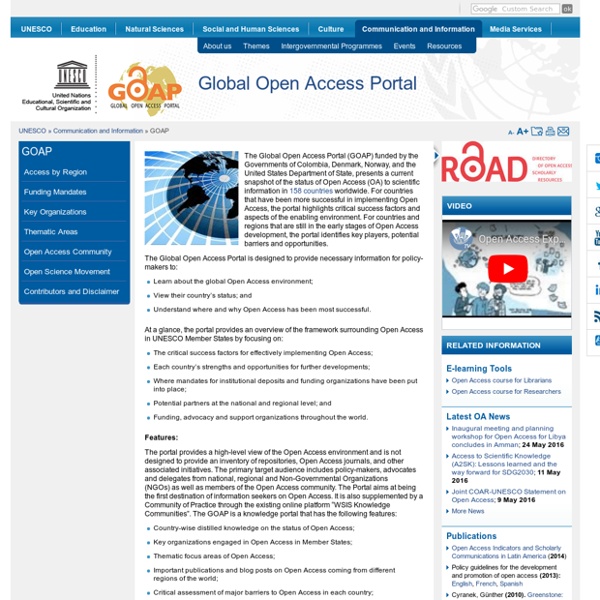Crowdsourcing
Un article de Wikipédia, l'encyclopédie libre. Le crowdsourcing, ou externalisation ouverte[1] ou production participative[2], est l'utilisation de la créativité, de l'intelligence et du savoir-faire d'un grand nombre de personnes, en sous-traitance, pour réaliser certaines tâches traditionnellement effectuées par un employé ou un entrepreneur. Ceci se fait par un appel ciblé (quand un niveau minimal d'expertise est nécessaire) ou par un appel ouvert à d'autres acteurs. Le travail est éventuellement rémunéré. Il peut s'agir de simplement externaliser des tâches ne relevant pas du métier fondamental de l'entreprise, ou de démarches plus innovantes. C'est un des domaines émergents de la gestion des connaissances, Il existe de nombreuses formes, outils, buts et stratégies du crowdsourcing[3]. Origine du terme[modifier | modifier le code] Le terme crowdsourcing est un néologisme sémantiquement calqué sur l'outsourcing (externalisation). Historique[modifier | modifier le code]
Avoin työpaikka
University of Oulu is an international scientific community, with 14,000 students and approximately 3,000 employees. By combining multidisciplinary research and education, high-level infrastructure and wide cooperation with international research and educational institutes, companies and the public sector it has created a significant research and innovation hub of “Science with an Arctic Attitude”. More information University of Oulu has a wide academic base with 8 faculties and several research institutes. Water, Energy and Environmental Engineering Research Unit (WE3) (www.oulu.fi/water) research covers a broad area of expertise including hydrology, water resources engineering and various aspects of environmental sciences. Work description This doctoral student position is linked to a large EU H2020 project called WATERAGRI that has a specific focus on agricultural water management and nutrient recovery from waste streams. Requirements How to apply Dr.
Solve Puzzles for Science | Foldit
Dr C Harrington
Personal web page Telephone: +44 (0) 191 33 45665 Room number: IM216, Al-Qasimi Building Contact Dr Cameron Harrington (email at cameron.harrington@durham.ac.uk) Cameron Harrington is an Assistant Professor of international relations in the School of Government and International Affairs. He earned his PhD in political science from The University of Western Ontario in 2014. Research Interests AnthropoceneCritical security studiesGlobal Environmental PoliticsIR TheoryPosthumanismWater Security Teaching Areas International OrganisationsInternational Relations TheoryInternational Security, Interdependence, and International OrganisationsTheory and History in International Relations Publications Authored book Harrington, Cameron & Shearing, Clifford (2017). Chapter in book Harrington, Cameron (2017). Journal Article Lecavalier, Emma & Harrington, Cameron (2017).
Cléo - Centre pour l'édition électronique ouverte
Dr Schmidt
Dr Jeremy Schmidt Personal web page Telephone: +44 (0) 191 33 41894 Fax: +44 (0) 191 33 41801 Room number: 223 (email at jeremy.schmidt@durham.ac.uk) Biography Jeremy Schmidt’s research focuses on the social dimensions of land, water, and energy, with particular attention to the ethical and political dimensions of human impacts on the Earth system. His book, Water: Abundance, Scarcity, and Security in the Age of Humanity, details the intellectual history of America’s water management philosophy. Dr. Prior to joining Durham University, Dr. Graduate Student Opportunities Dr. All of Dr. Research Interests Environmental governance, ethics, and policyThe Anthropocene and the social sciencesWater, land, and energy Publications Journal Article Authored book Schmidt, Jeremy J. & Matthews, Nathanial Global Challenges in Water Governance: Environments, Economies, Societies. Chapter in book Schmidt, Jeremy J. Edited book Brown, Peter G. & Schmidt, Jeremy J. Book review Supervises Mr Marcin Stanek
Libre accès à l'information scientifique et technique
International Journal of Water Governance
GreyNet International, Grey Literature Network Service
International Journal of Water (IJW) - Inderscience Publishers
This site uses some unobtrusive cookies to store information on your computer. By continuing to browse the site you are agreeing to our use of cookies. We use cookies to store sessions in order to provide an interactive and personal experience to our website users. We do not use cookies to serve adverts or other promotional materials. We also log your domain and IP address automatically when you visit our site; however, this information does not identify you as an individual, but only the computer that you are using to view the site and your approximate geographic location. We use cookies for a number of reasons, including the following: To enable article submission and peer-review processesTo enable full-text access for members of editorial boards and complimentary subscriptionsTo monitor site performance If desired, cookies can be disabled through your browser settings (refer to your browser's help pages for more information). By using our site you accept the terms of our Privacy Policy.
International Journal of the Commons




Le portail Global Open Access Portal (GOAP) présente un état des lieux du libre accès à l’information scientifique à travers le monde.
Pour les pays qui ont le mieux réussi dans la mise en œuvre du libre accès, le portail met en avant les facteurs de réussite et les caractéristiques de l’environnement habilitant. Pour les pays et région qui en sont encore au début du développement du libre accès, le portail identifie les acteurs clés, les barrières potentielles et les opportunités.
Le portail met en ligne les rapports nationaux de 148 pays avec des liens vers plus de 2000 initiatives/projets dans les Etats membres. Il bénéficie du soutien de la communauté de pratiques Open Access sur la plate-forme des Communautés du savoir du SMSI, qui réunit déjà plus de 1400 membres.
I
by abipesses Jan 30